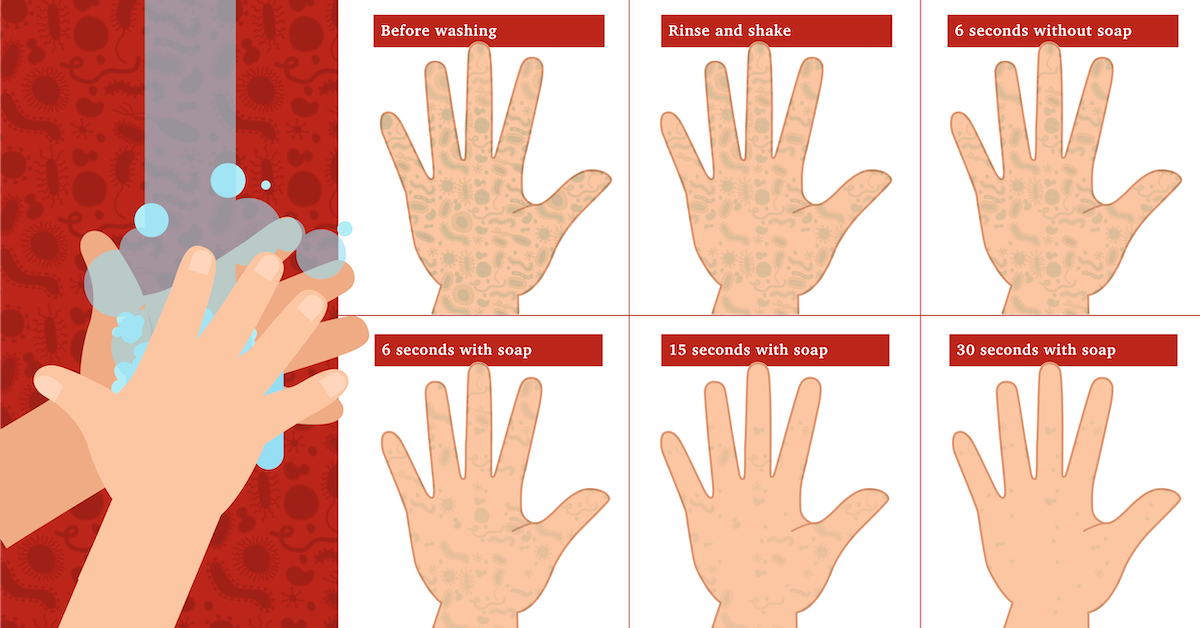Give Us A Hand: Proper Handwashing Techniques
Wash Your Hands to Avoid Coronavirus (COVID-19) and Other Viruses
 Unfortunately, flu viruses can last on solid surfaces, such as metal, wood and plastic,
for several hours. So, a sick person with poor handwashing techniques can touch a
doorknob at work and potentially infect numerous coworkers for the next couple hours.
Unfortunately, flu viruses can last on solid surfaces, such as metal, wood and plastic,
for several hours. So, a sick person with poor handwashing techniques can touch a
doorknob at work and potentially infect numerous coworkers for the next couple hours.
Therefore, properly washing your hands is paramount in preventing the spread of germs and viruses, such as coronavirus (COVID-19) and the flu.
But, as social media and news outlets are reporting, not everyone knows how to properly wash their hands.
How to Wash Your Hands
Follow these steps from the Centers for Disease Control and Prevention (CDC) and the World Health Organization (WHO) to make sure you wash your hands properly:
- Wet your hands with clean, running water (warm or cold) and apply soap.
- Rub your hands together to make a lather, and scrub them well. Be sure to scrub the backs of your hands, between your fingers and under your nails.
- Continue rubbing your hands for at least 20 seconds. Need a timer? Hum the “Happy Birthday” song from beginning to end twice.
- Rinse your hands well under running water.
- Dry your hands using a clean towel, or air dry them.
- Washing hands with soap and water is the best way to reduce the number of germs on your hands and, subsequently, on everything you touch.

Keep Hand Sanitizer Nearby
If soap and water aren’t available, use an alcohol-based hand sanitizer that contains at least 60 percent alcohol. Alcohol-based hand sanitizers can quickly reduce the number of germs on hands in some situations, but sanitizers do not eliminate all types of germs. Hand sanitizers are not effective when hands are visibly dirty.
Especially during this season of flu and COVID-19, we should all wash our hands often, and especially any time we leave our homes.
Keep Your Hands Clean
Once your hands are properly clean and dry, it’s important to avoid touching your face, other people and unclean surfaces. Keep a safe distance from people - about an arm’s length - and don’t be afraid to trade the traditional hand shake with an elbow bump until virus season runs its course.
When to Wash Your Hands
The CDC recommends properly and thoroughly washing your hands during these situations:
- Upon returning home
- Before, during and after preparing food
- Before eating food
- Before and after caring for someone at home who is sick with vomiting or diarrhea
- Before and after treating a cut or wound
- After using the toilet
- After changing diapers or cleaning up a child who has used the toilet
- After blowing your nose, coughing or sneezing
- After touching an animal, animal feed or animal waste
- After handling pet food or pet treats
- After touching garbage
- After hugging/shaking hands with someone
We all have to work together to prevent the spread of viruses. Taking preventative steps is our best defense to protect the most vulnerable among us. Take the time to wash your hands properly, and keep a safe distance from others.
Spread and Symptoms of COVID-19
The spread of COVID-19 is similar to the flu. When people with the virus cough or exhale, they release droplets of infected fluid that can land on nearby surfaces and can infect another person who comes in contact.
Symptoms of COVID-19 include fever, cough, shortness of breath and breathing difficulties. In more severe cases, the infection can cause pneumonia, severe acute respiratory syndrome, kidney failure and death.
To learn more about handwashing, visit the CDC website.
Visit TTUHSC's coronavirus page for all updates and guidance from the university on COVID-19.
Related Stories
Celebrating Veterans: TTUHSC’s General Martin Clay’s Legacy of Service and Leadership
From his initial enlistment in the Army National Guard 36 years ago to his leadership in military and civilian health care management roles, Major General Martin Clay’s career has been shaped by adaptability, mission focus and service to others.
Texas Tech University Health Sciences Center School of Nursing Named Best Accelerated Bachelor of Science in Nursing Program in Texas
The TTUHSC School of Nursing Accelerated Bachelor of Science in Nursing (BSN) program has been ranked the No. 1 accelerated nursing program in Texas by RegisteredNursing.org.
TTUHSC Names New Regional Dean for the School of Nursing
Louise Rice, DNP, RN, has been named regional dean of the TTUHSC School of Nursing on the Amarillo campus.
Recent Stories
The John Wayne Cancer Foundation Surgical Oncology Fellowship Program at Texas Tech University Health Sciences Center Announced
TTUHSC is collaborating with the John Wayne Cancer Foundation and has established the Big Cure Endowment, which supports the university’s efforts to reduce cancer incidence and increase survivability of people in rural and underserved areas.
TTUHSC Receives $1 Million Gift from Amarillo National Bank to Expand and Enhance Pediatric Care in the Panhandle
TTUHSC School of Medicine leaders accepted a $1 million philanthropic gift from Amarillo National Bank on Tuesday (Feb. 10), marking a transformational investment in pediatric care for the Texas Panhandle.
Texas Tech University Health Sciences Center Permian Basin Announces Pediatric Residency Program Gift
TTUHSC Permian Basin, along with the Permian Strategic Partnership and the Scharbauer Foundation, Feb. 5 announced a gift that will fund a new pediatric residency.
